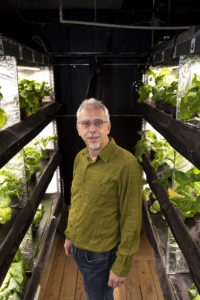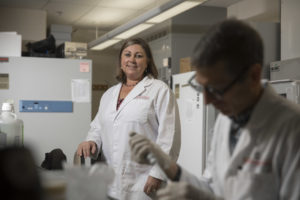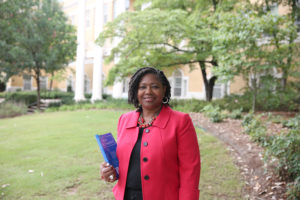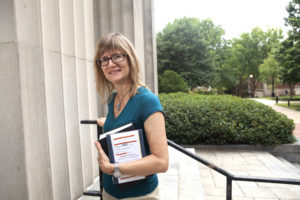Distinguished Research Professors
The title of Distinguished Research Professor is awarded to faculty who are internationally recognized for their contributions to knowledge and whose work fosters continued creativity in their discipline. See more at research.uga.edu/research-awards/.
Jon Amster
Cracking secrets of complex molecules
Jon Amster, professor and head of the department of chemistry, is a pioneer in mass spectrometry-based analytical approaches to understanding glycosaminoglycans (GAGs). These carbohydrates are essential to organisms from bacteria to humans, binding to proteins for cell signaling, inflammation, pathogenic infections and cancer. But GAGs are among the most challenging molecules to analyze. Scientists don’t fully understand how cells create these highly complex molecules, which can exist in many similar but different forms. Identifying how GAGs are created and how they may be involved in disease could lead to the development of drugs that block their action. Amster was a leader of the first team to develop high-powered tools into which GAGs were placed and broken into predictable pieces, allowing scientists to learn their sequences and structures. He also developed new software for automated analysis of the data, providing faster sorting and identification tools that could someday hasten biomedical applications including new treatments.
John Burke
Advancing understanding of plant domestication and crop evolution
John Burke, professor in the department of plant biology, is a world leader in fusing traditional evolutionary analyses with state-of-the-art genomic approaches in plant domestication research. His research has increased understanding of the genetics and genomics of crop domestication, the critical role of hybridization in plant evolution and the risks associated with crop-wild gene flow. In his studies of sunflowers and related species (Helianthus species complex), he has examined the molecular and phenotypic evolution of crop plants and the potential for such research to inform modern breeding efforts. Burke has advanced knowledge of the genomic basis of how plants respond to stressful environmental conditions and how hybridization can facilitate such adaptation. These insights, along with the tools and genomic resources that he has developed, represent major contributions to the discipline. In addition, his research on gene flow and introgression is widely recognized as significant in the growing field of risk assessment of genetically engineered crops.
Jason Colquitt
Benefits of workplace fairness and justice
The research of Jason Colquitt, the William Harry Willson Distinguished Chair in the department of management, clarifies the benefits of managing employees fairly. He has been a major force in growing this research area from a narrow social psychology topic to a thriving research field. He explores behavior that leaders can develop in themselves to treat their employees fairly, as well as the impact of fair behavior on employee trust in leaders, satisfaction with work and commitment to employers. Colquitt developed a four-dimensional measure of fairness that is by far the most commonly used measure in the field. He was one of the first to find that fairness occurs as a workplace climate—a collective, shared experience—and that “justice climates” have important implications for team performance.
His work includes meta-analyses, longitudinal field studies, laboratory experiments and theory papers. Many of the most productive scholars in the field today got their start as his Ph.D. students.
Diana Downs
The metabolic complexity of bacteria
Diana Downs, professor of microbiology, has made transformative contributions to her field by exploiting genetic analysis to help solve important biochemical mysteries of bacterial life. A key theme of her research is that pulling one thread of metabolism reveals interconnected threads in unexpected ways. By using a biochemical genetic approach, she has advanced understanding of thiamine synthesis, specifically uncovering connections between this pathway and others in the cell. Her genetic research has also provided insight into the complexities of chemistry inside all cells and the evolution of new pathways. Her work has yielded ideas and information critical to understanding how pathways are controlled and have evolved. Downs has elucidated previously unknown metabolic networks, revealed subtle metabolic connections in bacteria and mapped new mechanisms of metabolic regulation. These mechanisms are conserved in biology, making her basic biomedical research relevant to applied fields like metabolic engineering, synthetic biology and infectious disease.
2019 Entrepreneur of the Year Award
The Entrepreneur of the Year Award recognizes a faculty member who has started a company based on UGA research.
Marc van Iersel is the Vincent J. Dooley Professor of Horticulture in the College of Agricultural and Environmental Sciences. He has spent more than 20 years supporting the horticulture industry through his research examining crop physiology and smart greenhouse production systems.
A pioneer in optimizing controlled environment agriculture, van Iersel was elected as a Fellow of the American Society for Horticultural Science in 2018, recognizing his lifetime contributions to the horticulture industry.
In 2017, he and colleague Erico Mattos co-founded Candidus Inc., a UGA agtech startup that is delivering customized lighting solutions for greenhouse agriculture, maximizing plant growth while minimizing electricity costs. Candidus’ novel technology creates predictability for growers by providing consistent lighting, which yields stronger, healthier plants.
In addition to his role as CTO of Candidus, van Iersel served as mentor and advisor of UGA startup Reservoir LLC, a wireless irrigation company with a patent-pending sensor designed to improve
irrigation efficiency.
2019 Inventor of the Year Award
The Inventor’s Award is for a unique and innovative discovery that has made an impact on the community.
Holly Sellers, professor at the Poultry Diagnostic and Research Center, pursues clinical and molecular virology research with an emphasis on viruses that cause respiratory, enteric and musculoskeletal diseases in poultry, focusing on the identification, characterization and control of those viruses. She also directs virology services at PDRC and mentors graduate and professional students.
Her research has led to 12 invention disclosures and five U.S. patents, with another application pending and a multitude of foreign patents and applications.
Sellers’ technologies have been made available to industry partners through more than 20 license agreements, leading to four commercial poultry vaccines as well as numerous autogenous vaccines that together support and secure Georgia’s $28 billion poultry industry.
Sellers is a UGA alumna who received both her master’s and Ph.D. in medical microbiology from the College of Veterinary Medicine.
Creative Research Medals
Creative Research Medals are awarded for outstanding research or creative activity within the past five years that focuses on a single theme identified with the University of Georgia.
Kelly E. Happe
Creative Research Medal in the Humanities and Arts
Implications of race and gender in genomic science
Kelly E. Happe, associate professor in the communication studies department of the Franklin College of Arts and Sciences and the Institute for Women’s Studies, blends the insights of rhetorical research and feminist science studies to address genomic science.
She makes a strong case that it is improbable for any science involved with race, gender and genomics to avoid re-inscribing problematic historical ideas and social norms. In her groundbreaking 2013 book, The Material Gene: Gender, Race and Heredity after the Human Genome Project, Happe explores the rhetorical effects of genomics on both medical and lay understandings of disease, gender, race and heredity.
One of her primary concerns is the legacy of eugenics in today’s genomic research. Race, she writes, is being recast in subtle ways as deficiency or abnormality by the Human Genome Project and other genomic research efforts.
Carrying this critique further, she argues that genomic research treats susceptibility to disease as something one inherits rather than acquires, and therefore genomic research problematizes black bodies.
Mable Fok
Creative Research Medal in Natural Sciences and Engineering
How to unblock emerging wireless systems
The interdisciplinary research of Mable Fok, associate professor in the School of Electrical and Computer Engineering, spans system design, hardware implementation and algorithms in an effort to overcome the future crunch in spectral bandwidth.
She has identified some of the bandwidth limitations of emerging 5G wireless systems and proposed a combined use of light and artificial neural algorithms to address them. Light can provide the flexibility, bandwidth and speed lacking in existing electronics. Artificial neural algorithms can provide the necessary computer recognition and automation tasks.
Turning to nature for inspiration, her research team has employed a light-based device that mimics an algorithm in an electric fish’s jamming avoidance response. The experimental device can autonomously move the frequency of an emitted signal away from other signals, potentially reducing interference.
This research could inspire new ways to accommodate increasing numbers of wireless devices and data transmissions competing for space on limited available bandwidth.
Nathan T. Carter
Creative Research Medal in Social and Behavioral Sciences
Clarifying the relation of personality to work and life outcomes
Nathan T. Carter, associate professor of psychology in the Franklin College of Arts and Sciences, is a leading researcher in the fields of industrial-organizational
psychology and personality assessment.
His work challenges the traditional assumption that higher levels of personality traits—agreeableness, conscientiousness, emotional stability, extraversion and openness—are associated with improved work outcomes such as task performance and broader well-being outcomes such as job and life satisfaction.
But with his expertise in measurement theory and statistical analysis, Carter has shown that individuals with extremely high levels of personality traits actually often show fewer positive outcomes at work and other life outcomes than those with more moderate standing. Limitations in standard scoring and analysis practices had obscured accurate associations, resulting in a mixed literature on the topic.
In Carter’s current research, he is developing insights that further understanding of personality and its role in work behavior and other important life outcomes.
Early Career Scholar Awards
Hitesh Handa
Fred C. Davison
Early Career Scholar Award
Hitesh Handa, assistant professor in the School of Chemical, Materials and Biomedical Engineering, focuses on developing new biocompatible coating materials for medical implant applications. He strives to transform medical device research from a largely trial-and-error process to one guided by theoretical and experimental understanding of reaction pathways at the molecular level.
His multidisciplinary work combines basic chemical sciences, materials chemistry and bioengineering with biology and animal models. Handa aims to develop coating materials that mimic the human body’s production of nitric oxide, which has anti-inflammatory and antimicrobial properties and can prevent thrombosis on medical devices, making them safer for patients.
Handa’s work has been funded by NIH, CDC, U.S. Army, Veteran Affairs, Geneva Foundation, Juvenile Diabetes Foundation and various medical device companies. His research group has generated 10 patent disclosures in a three-year period, reflecting his desire to translate these technologies to clinical practice through his startup
inNOveta Biomedical LLC.
Justin A. Lavner
Charles B. Knapp
Early Career Scholar Award
Justin A. Lavner, assistant professor in the psychology department in the Franklin College of Arts and Sciences, has advanced understanding of how marriages change and why some relationships succeed and others struggle.
He has focused on the newlywed years as a critical period of risk in marital life and identified a set of baseline vulnerability factors that increase the likelihood of more negative marital trajectories and divorce during this period. These vulnerability factors include maladaptive personality traits, poor communication and elevated levels of stress.
He has outlined practical implications of his research, suggesting an expanded set of targets for preventive interventions for couples and families. Interventions, Lavner argues, should not only build a couple’s skills but also focus on reducing stress.
His findings offer the field a flexible, broadly applicable framework for understanding relationships that is capable of guiding family policy and clinical interventions to promote well-being for couples and families.
Liza Stepanova
Michael F. Adams
Early Career Scholar Award
Liza Stepanova, assistant professor of piano in the Franklin College of Arts and Sciences, has had an exceptional four years on the faculty in the Hugh Hodgson School of Music.
As a soloist and chamber musician, she has performed in concerts in many of the most important music venues across the globe. In just the past two years, she has appeared in four commercial recordings released on four labels, reflecting the breadth and reputation of her appeal. These recordings cover a range of projects and include world-premiere performances by American composers.
During her career, Stepanova has performed in such venues as Carnegie Hall, the Kennedy Center and the Berlin Philharmonic Hall, and she has two more recordings slated for release within the next year.
Her public artistic success lays the foundation for her role as pedagogue, modeling the successful performing artist at the highest level and building the next generation of young pianists.
Her numerous articles, invited book chapters and conference presentations contribute to the understanding of French Atlantic theatre and the cultural similarities and differences among work by artists from Africa, what is now known as “black France,” the U.S. and the Caribbean.
Creative Research Awards
Creative Research Awards recognize outstanding bodies of work that have gained broad recognition.
Emilie Phillips Smith
William A. Owens Creative Research Award
Emilie Phillips Smith, professor and former department head of human development and family science in the College of Family and Consumer Sciences, studies the role of sociocultural variables in child and family development.
She engages children and families of diverse racial-ethnic and socio-economic backgrounds in rigorously tested approaches to reduce youth hyperactivity and problem behavior and promote positive identity and development. Smith’s work deploys rigorous cluster randomized trials integrating multi-method approaches to examine the effects of evidence-based practices on children, their caregivers and care settings. This applied research has demonstrated positive effects not only on individual youth, but also on violence, aggression and victimization across multiple schools, locales and universities.
A pioneer in implementation science, she is advancing the use of connected technologies and telehealth in building capacity for fostering effective practices. Her studies are interdisciplinary, highly original and influential, involving collaborations with colleagues and community stakeholders and providing unique research opportunities for students.
Lance Wells
Lamar Dodd Creative Research Award
The research of Lance Wells, professor in the Complex Carbohydrate Research Center, provides a foundation for understanding O-glycans, which play a critical role in determining protein structure, function and stability. Aberrations in these molecules are responsible for certain human diseases and also associated with disease risk factors.
Wells’ laboratory work on O-glycans has shown a creative fusion of cutting-edge “omic” biochemical analytics with an ability to identify important and novel biological questions. He deploys an innovative combination of methodologies, including mass spectrometry, protein biochemistry, genetics, proteomics and cell and molecular biology.
Wells’ experiments have greatly helped advance understanding of the roles of these molecules in biology. For instance, his research into abnormal O-glycans underlying congenital muscular dystrophy has provided a molecular understanding of the etiology of this disease. His work has also elucidated a number of high-potential therapeutic targets in disease states such as Alzheimer’s, Type 2 diabetes and cancer.
Elizabeth Wright
Albert Christ-Janer Award for Creative Research
Elizabeth Wright, professor of Spanish in the Franklin College of Arts and Sciences, studies how empire building shaped Spanish literature and culture at the dawn of the modern era.
Her scholarship combines an imaginative and dexterous use of literary texts and archival materials to offer subtle insights and new ways of understanding the cultural ferment associated with modernity. Since 2017, she has been the editor of the Bulletin of the Comediantes, the premier journal in her field.
Her current book project, Stages of Servitude: Scenes from the Atlantic Slave Trade, ponders how slave trafficking took root, even though rulers and the population at large took note of its cruelty and illegality. But this study also explores how enslaved and free black people negotiated economic advancement and even claimed artistic validation, thereby casting new light on a long-neglected dimension of Spain’s Renaissance.






















